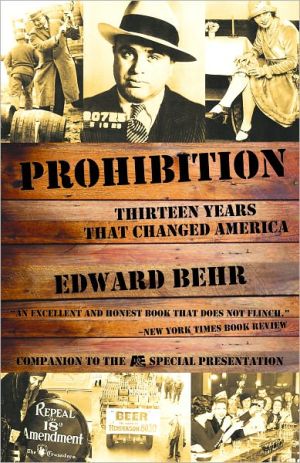

 |

|

The average rating for Prohibition: Thirteen Years That Changed America based on 2 reviews is 3 stars.
Review # 1 was written on 2015-07-24 00:00:00 Larry Kirk Larry KirkIn America from 1920 to 1933 a grand experiment was tried on a divided issue of alcohol consumption. There was a huge push from groups like the Anti Saloon League and the Women's Christian Temperance Movement to have alcohol distribution and consumption stopped. Wayne Wheeler as the head of the Anti Saloon League was able to muster together loose alliances such as wives of husbands who spent their money in saloons rather than on the household and anti-German citizens who resented the German immigrants making of money from owning most of the breweries. Wheeler wielded considerable power in the political arena providing campaign funding for many pro prohibitionists. The bill that was introduced to the U.S. Congress was called the Volstead Act after Congressman Andrew Volstead who managed the bill. Its purpose was stated as to prohibit intoxicating beverages, to regulate the manufacture, sale, or transport of intoxicating liquor, and to ensure an ample supply of alcohol and promote its use in scientific research and in the development of fuel, dye and other lawful industries and practices, such as religious rituals. The Congress approved it over the veto of President Woodrow Wilson. And after the 36 necessary states ratified the Volstead Act it was added to the U.S. Constitution as the 21st amendment. The problem with the law was that the government was too small to enforce it. In consequence, Speak easies quadrupled and underground alcohol distribution became prevalent. In fact, New York City had more than 30,000 speak easy establishments in 1925 alone. Many distributors became enormously wealthy. One such man was George Remus. Remus ran a distribution center in Cincinnati Ohio. He paid off politicians, policeman and judges to protect him and lived as an outstanding member of the community. However, his luck changed when he was convicted of violations of the Volstead Act and sentenced to two years in the Atlanta Federal penitentiary. There he confided in an undercover probation officer named Franklin Dodge whom he told that his wife had control of his money. Dodge took that information and met Imogene Remus (George's wife). He convinced Imogene to withdraw all George's money and empty all his household valuables which included letters written by George Washington. Imogene also filed for a divorced when George was in prison. When George was released from jail, he went to his home and found it completely empty. Shortly afterward, surprisingly Imogene was found dead from gunshot wounds. As a consequence, George was not only broke but was also brought up on murder charges for killing Imogene. In a sensational trial, it was uncovered that Franklin Dodge and Imogene had planned trying to get a federal deportation ruling and if that failed they planned on murdering George. George was acquitted in 1927 and this information had much to do with it. Afterward George moved from Cincinnati to Covington, Kentucky and lived a modest life until his death in 1952. Prohibition had issued in a slew of gangsters and an eye opening look at corruption which had caused many people began to turn against it. In addition, the ardent spoke person, Wayne Wheeler, for the support of prohibition had passed way in 1927. And as a result, it was appealed in 1933. The author states the just 5% of prohibition violators were prosecuted. He also claims that just 10% of the current "War on Drugs" violators have been prosecuted and more than half the prison population is in jail due to drug violations. Does prohibition give us a historical reference to base the War on Drugs On? Maybe So. |
Review # 2 was written on 2009-01-15 00:00:00 Scott Houston Scott HoustonUsually when I can't think of much to say about a book I'll go with "it was well-written", faint praise at best as one would hope a book that managed to get published was at least not poorly written. But I can't even muster up that much enthusiasm for this book. Maybe I've just been run ragged or fighting my biological impulse to hibernate lately, but I fell asleep more while reading Prohibition than any recent book I can remember. It didn't hold my attention at all, and some of the author's stylistic tics and repeated cliches bordered on off-putting. The scope of the book didn't really live up to the sub-title, either. A good bit of time is spent on the development of the "dry" movement in America and the post-WWI push for a prohibition amendment, and then a here-and-there approach to the 13 years of Prohibition itself: biographical sketches of a bootlegger and a corrupt attorney general, some surveys of telling statistics, a couple of mentions of President Harding and Al Capone. And then the book ends on December 5, 1933, so any ways in which America really was changed as a result of Prohibition are left to the reader's observation and/or imagination. I find the 1920's to be an interesting period in US history, especially in light of Prohibition, but that interest going in was the only thing that kept me going through the book. It just didn't deliver exactly what I was looking for. There were some interesting tidbits, but not the nuts and bolts I was more curious about. I have some other Prohibition-focused books on my shelf, though, and maybe those will yield more. |
CAN'T FIND WHAT YOU'RE LOOKING FOR? CLICK HERE!!!